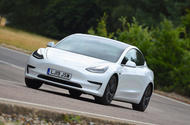Tesla’s marketing material found to falsely imply its cars are fully capable of self-driving
A German court has ruled that Tesla’s use of the term ‘Autopilot’ to describe its cars’ autonomous driving capabilities is “misleading for consumers”.
Munich Regional Court made the ruling in response to a complaint from Germany’s Central Office for Combatting Unfair Competition. It found that Tesla models are still unable to complete a journey without human intervention, even equipped with the firm’s Autopilot software and the optional “Full Self-Driving Capability” package.
The court said that in using these terms in its marketing and sales material, Tesla suggests that its models “are technically able to drive completely autonomously”, but drivers are still required to be alert at all times and intervene in case of emergency.
In July 2019, the Californian brand had promised “full potential for autonomous driving” for German customers by the end of the year. The functions, already deployed in some markets including the US, were to include traffic light recognition and automatic stopping and starting in urban areas.
Tesla has now been banned from using this language in Germany, where vehicles are not yet permitted to drive autonomously on public roads, though it can appeal the decision.
Matthew Avery, research director at vehicle testing body Thatcham, which is a part of the Euro NCAP safety body, said: “We have long warned of the pitfalls to the Autopilot system. Its seemingly competent performance can encourage drivers to hand too much control to the vehicle and lose sight of their responsibilities behind the wheel. This is a progressive process that begins when motorists are marketed the ‘self-driving’ experience.
“Autopilot is not a self-driving system. It is there to provide driver assistance, not become an invisible chauffer. We support the German competition commission’s ruling. Naming is key, and Autopilot is an especially misleading term.”
Tesla CEO Elon Musk took to Twitter to criticise the ruling, arguing that the Autopilot system was “named after the term used in aviation”, and drawing links with the German word for motorway: autobahn.
Israeli tech firm Mobileye, which helped develop Autopilot, cut ties with Tesla in 2016 following a fatal crash involving the system, and the Full Self-Driving Capability option was removed from the brand’s UK site in 2018 following assertions from safety body Euro NCAP that it was misleading.
READ MORE
Inside the industry: Tesla’s success starts on the playground
Saloon showdown: Tesla Model 3 vs BMW 3 Series
Tesla removes ‘Full Self-Driving Capability’ from options list
Source: Autocar
